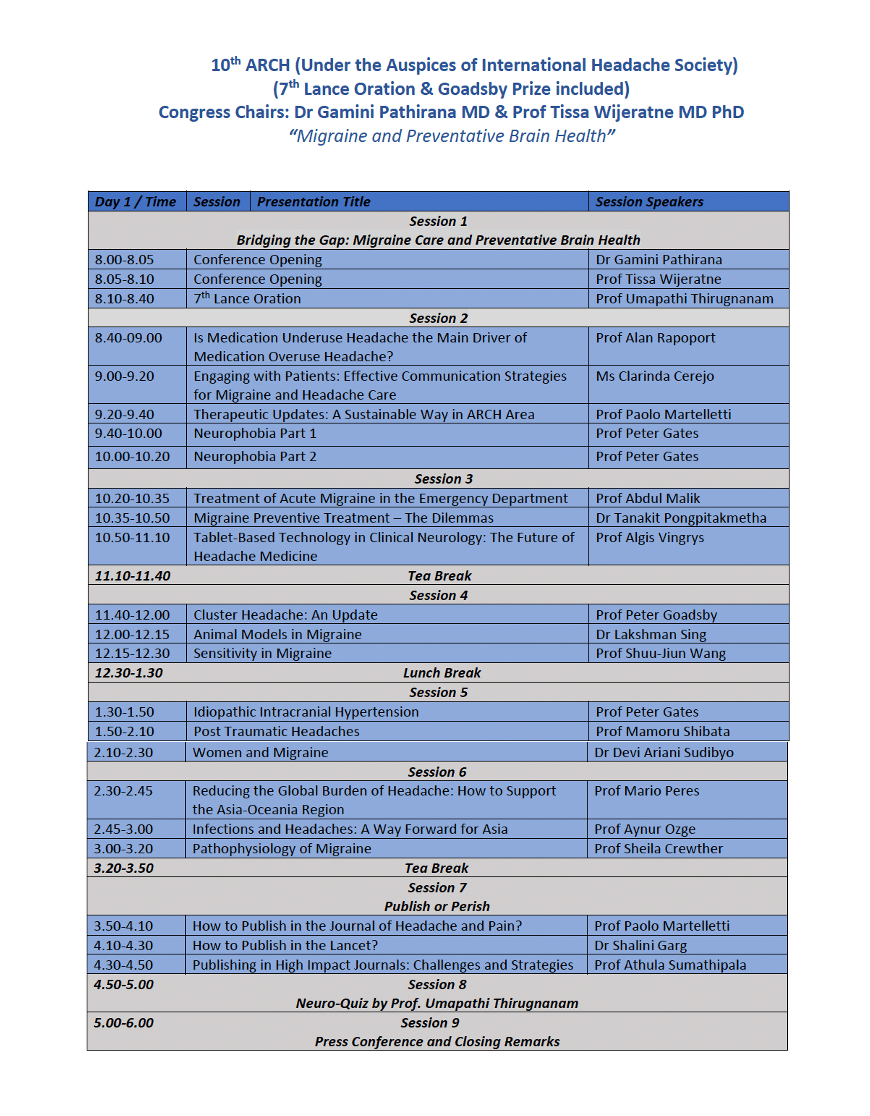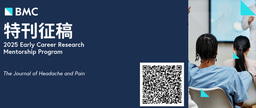Strengthening a Partnership
Published in Biomedical Research

The collaboration between the Asian Regional Consortium for Headache (ARCH) and The Journal of Headache and Pain is strengthened. The proceedings of the 10th ARCH Congress, 18-19 December 2024, Colombo, Sri Lanka, will be published as a Supplement to The Journal of Headache and Pain.
Following the publication of the Thematic Series Migraine and Brain Health: Towards Better Understanding from the Asia-Oceania Region this further step of collaboration will contribute to global migraine research while emphasizing the perspectives and needs of the Asia-Oceania community.

Follow the Topic
-
The Journal of Headache and Pain

The Journal of Headache and Pain is a peer-reviewed open access journal specifically dedicated to researchers involved in all aspects of headache and related pain syndromes, including epidemiology, public health, basic science, translational medicine, clinical trials and real-world data.
Related Collections
With Collections, you can get published faster and increase your visibility.
Focus Africa
The Journal of Headache and Pain is calling for submissions to our Collection on Focus Africa. Migraine is a major cause of disability worldwide, yet research efforts and healthcare strategies remain unevenly distributed across regions. In Africa, diverse populations and healthcare landscapes present unique challenges in the recognition, diagnosis, and management of migraine and other headache disorders. This thematic collection, Focus Africa, aims to enhance understanding of these conditions by exploring epidemiological trends, healthcare disparities, cultural influences, financial constraints, gender-related factors, and the availability of treatment options across the continent.
We invite submissions of original research, systematic and narrative reviews, editorials, rapid reviews, and commentaries on topics including, but not limited to:
• The prevalence, burden, and impact of migraine and other headache disorders across African countries
• Socio-economic and cultural determinants of headache disorders in Africa
• Insights into the pathophysiology of migraine from an African perspective
• Barriers to headache care, healthcare inequalities, and policy solutions
This Collection provides a dedicated platform for African researchers and clinicians to contribute to global headache science while addressing the specific needs of the region. By fostering collaboration and knowledge exchange, Focus Africa aims to drive meaningful advancements in migraine and headache disorders research and care across the continent.
Therefore, the collection welcomes researchers from author groups all with their main affiliated institution in Africa. Cross-continental authorship groups are welcome to submit their work to The Journal of Headache and Pain outside of this collection.
Springer Nature offers article processing charges (APC) waivers and discounts for articles published in our fully open access journals whose corresponding authors are based in the world’s lowest income countries (see our APC waivers and discounts policy for further information). Requests for APC waivers and discounts from other authors will be considered on a case-by-case basis and may be granted in cases of financial need (see our open access policies for journals for more information). All applications for discretionary APC waivers and discounts should be made at the point of manuscript submission; requests made during the review process or after acceptance are unable to be considered. Should applications for financial support via the above process be unsuccessful, authors are encouraged to reach out to the journal.
Publishing Model: Open Access
Deadline: Mar 20, 2026
Community pharmacy and headache care
In the sustainable development goals (SDG) context of seeking universal health coverage, the expanding gap between the supply of specialized and primary providers of headache-related health care on the one hand and the care needs of the very large number of people affected by headache on the other is a formidable but not insoluble public-health challenge. Structured headache services provide a cost-effective framework for provision of care but may still be overwhelmed by demand. Community pharmacists are an underutilized resource, potentially well able to provide the solution. This collection aligns with UN SDG-3 (Ensure healthy lives and promote well-being for all at all ages), and more specifically with SDG-3.8 (Achieve universal health coverage ..., access to quality essential health-care services and access to safe, effective, quality and affordable essential medicines ... for all). The collection may include reports (especially comparative studies) on current pharmacy practice (scope, responsibilities and regulatory and other restrictions) relevant to headache care in countries worldwide — especially, but not restricted to, low and lower-middle-income countries; studies of pharmacists' knowledge and understanding of headache disorders and their management, theoretically argued proposals for change that, through educational initiatives, expansion of community pharmacists' scope of practice or by other means, might relieve strained headache-care systems; and studies of workload-shifting in headache care from medical to community pharmacy services (economic evaluations, theoretical or empirical assessments of benefits versus harms, and reports of pilot implementations either in headache care or in other therapeutic areas that might be pathfinders for headache care).
This Collection supports and amplifies research related to SDG 3, Good Health & Well-Being.
All submissions in this collection undergo the journal’s standard peer review process. Similarly, all manuscripts authored by a Guest Editor(s) will be handled by the Editor-in-Chief. As an open access publication, this journal levies an article processing fee (details here). We recognize that many key stakeholders may not have access to such resources and are committed to supporting participation in this issue wherever resources are a barrier. For more information about what support may be available, please visit OA funding and support, or email OAfundingpolicy@springernature.com or the Editor-in-Chief.
Publishing Model: Open Access
Deadline: May 01, 2026





Please sign in or register for FREE
If you are a registered user on Research Communities by Springer Nature, please sign in